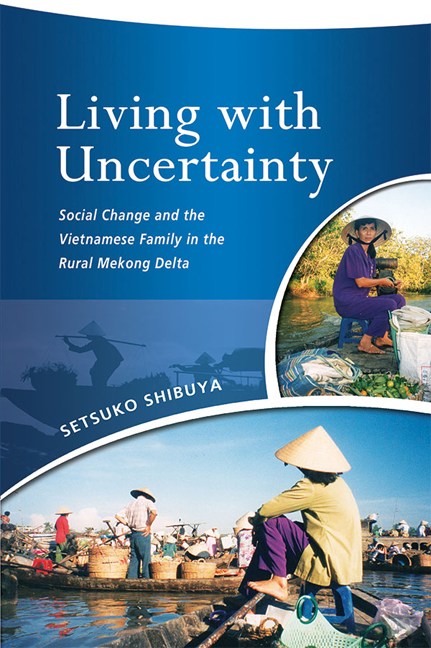Book contents
- Frontmatter
- Contents
- Acknowledgements
- 1 Introduction: Family and Society in Vietnam
- 2 On the Bank of the Mekong River
- 3 Family as the Social Unit
- 4 Farming Together
- 5 Working Outside of the Family
- 6 Education of Children and the Future
- 7 Feeling Poor
- 8 Social Change and the Family in the Rural Mekong Delta
- Bibliography
- Index
- About the Author
5 - Working Outside of the Family
Published online by Cambridge University Press: 19 May 2017
- Frontmatter
- Contents
- Acknowledgements
- 1 Introduction: Family and Society in Vietnam
- 2 On the Bank of the Mekong River
- 3 Family as the Social Unit
- 4 Farming Together
- 5 Working Outside of the Family
- 6 Education of Children and the Future
- 7 Feeling Poor
- 8 Social Change and the Family in the Rural Mekong Delta
- Bibliography
- Index
- About the Author
Summary
JOBS OUTSIDE OF AGRICULTURE
Though family farming remains the main livelihood of the rural Mekong Delta, some people spend much of their everyday lives in jobs outside of agriculture. It is difficult for farmers to earn enough income from agricultural activities, so some members of their families seek jobs outside of agriculture to provide enough earnings for the present as well as the future. The inhabitants of Long Tuyen and the neighbouring villages are engaged in a variety of occupations outside of agriculture, which at first seemed a little surprising to me. Many are part-time or seasonal jobs that supplement agricultural activities, the main source of their income. There are also full-time jobs which serve as the primary occupation.
Jobs outside of agriculture have a significant meaning for family life, because in one sense, they constitute a life beyond the family. While agricultural activities are almost exclusively family-based (both nuclear and extended, including in-laws), jobs outside of agriculture are mostly conducted outside of the family sphere. They constitute a place in which people may experience other social relationships that affect family values. However, working outside of the family does not necessarily mean separation from the family. On the contrary, jobs are interconnected with family life in a number of ways. Most jobs create a social environment that incorporates members of the families.
The information I gathered on jobs outside of agriculture come from not only Long Tuyen Village, but also other villages, where these occupations are more common. I also visited a few workplaces in those villages.
SUPPLEMENTARY (PART-TIME) JOBS
One of the most popular part-time or seasonal jobs taken by Long Tuyen villagers is bricklaying (tho ho), a job that has been available to villagers for a long time. Those working as bricklayers are almost exclusively men. For example, one farmer has been working as a bricklayer since 1968. In order to be a bricklayer, he served his apprenticeship with another bricklayer for over three years and was trained before he started to work independently. He says it is not very difficult to become a bricklayer, because the job does not require a lot of education. In his opinion, “Whether you can become a bricklayer or not depends on determination. If you are determined to become one and work hard, you can be a layer.”
- Type
- Chapter
- Information
- Living with UncertaintySocial Change and the Vietnamese Family in the Rural Mekong Delta, pp. 121 - 151Publisher: ISEAS–Yusof Ishak InstitutePrint publication year: 2015

